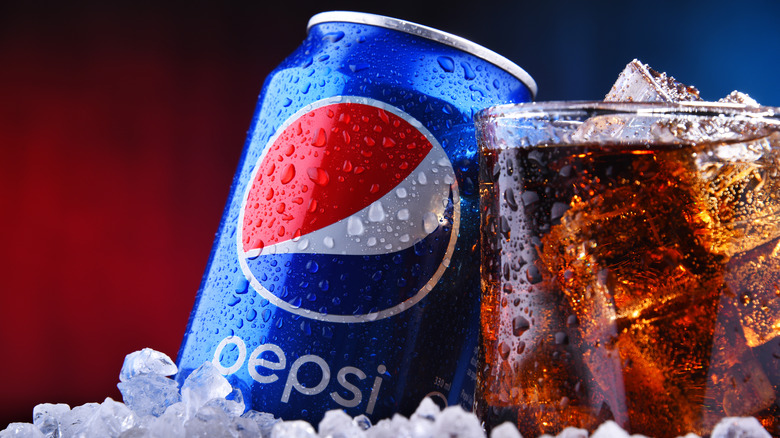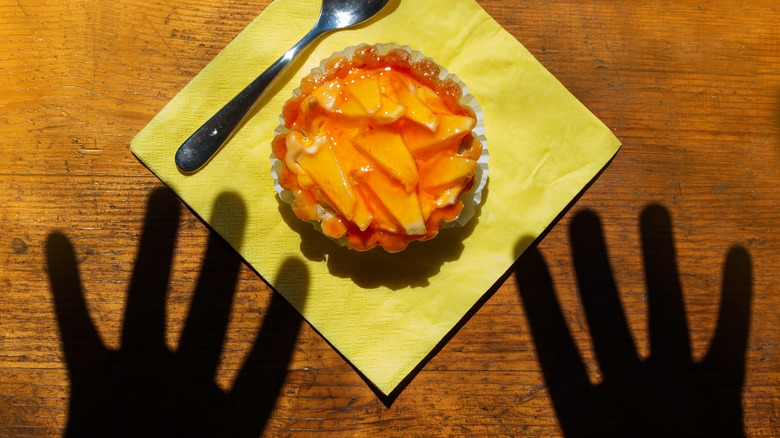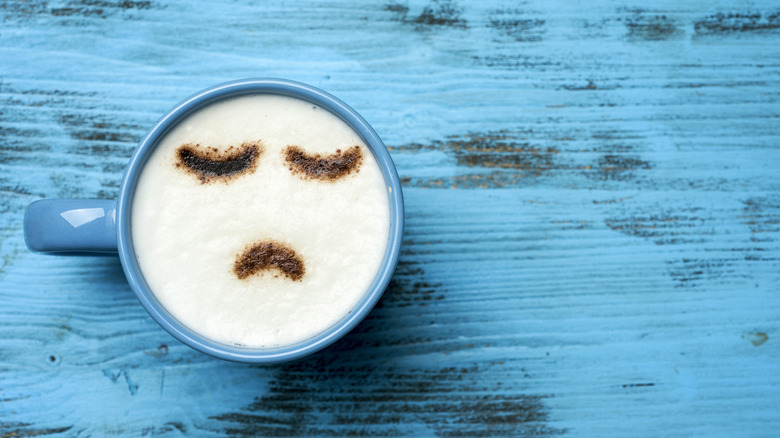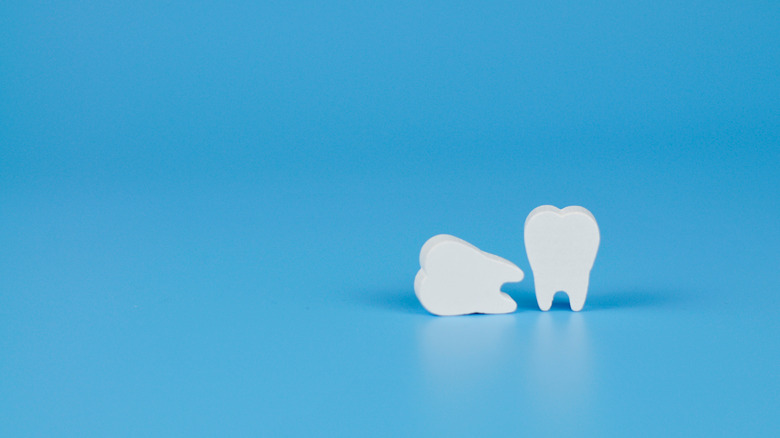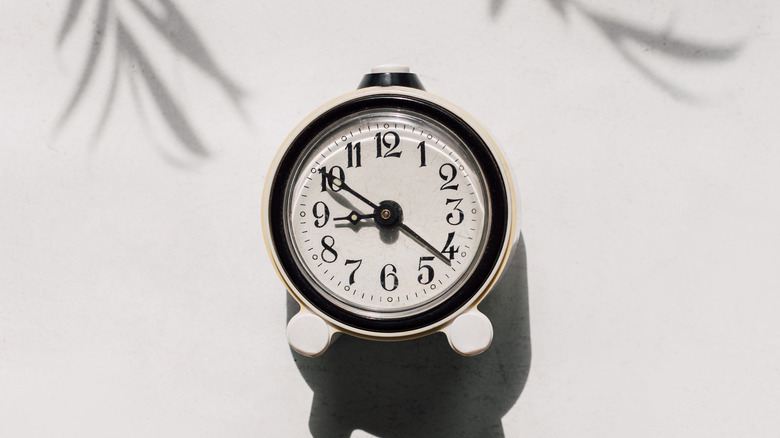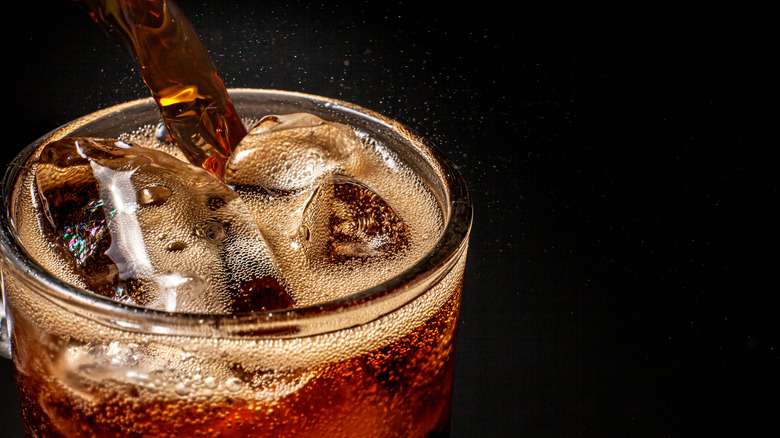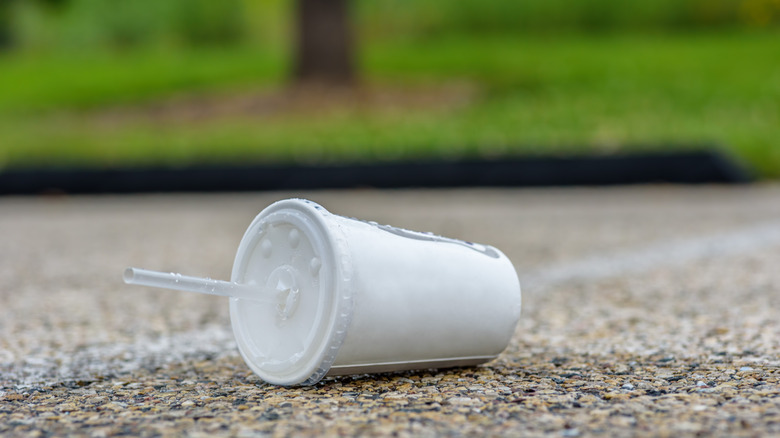What Happens To Your Body When You Drink Soda Every Day
The soft hiss when you pull the ring off the top, the ice-cold can, the refreshing fizz as you pour it into a glass ... soda is truly one of life's treats. And, it appears that more than a few people think so. With the global carbonated soft drinks industry expected to be worth over $394 billion by the end of 2021 (per Green Seed Group), it's clear that soda's going nowhere. In fact, it's estimated that, on average, Americans each spend $125 a year on soda, according to Statista. That's a lot of Coke.
But, let's face it. Most of the time, sodas aren't exactly good for you. "Soda is far from healthy," says Geisinger Community Medical Center registered dietitian nutritionist Gina McArdle to Eat This, Not That!. These drinks are often pumped full of sugar, caffeine, and artificial sweeteners and, over time, these ingredients can have an impact on your health. McArdle is pretty clear on this fact: "While having an occasional soda isn't going to have lasting long-term effects, having one or more sugary drinks every day will."
What are these effects? Let's take a deep dive into the soda stream, and see what actually happens when you drink soda every day.
You'll want to eat more food
When we eat or drink something to satisfy ourselves, the last thing we want to happen is for that very thing to make us want to eat more. But, that's exactly what drinking soda every day might do, by causing you to consume more energy over time. This is according to a review of studies published in the American Journal of Public Health, which looked at the link between energy intake and soda consumption. The review, which looked at 88 studies in total, found "clear associations" between drinking soda and consuming more energy, with one study finding that participants who drank soda ate, on average, 17% more than they would if they didn't drink soda.
There are several reasons why this could be the case, with one further study, presented via the BBC, proposing that one factor could even be the carbonation of the drink, itself. The study found that drinking carbonated beverages could stimulate the release of ghrelin, also known as the "hunger hormone," causing people to want to eat more. However, the study, led by Aston University's Research Explorer, Dr. James Brown, advised against switching to non-carbonated, but equally sugary drinks to get around this, as all that added sugar won't help.
You might increase your chance of memory loss-related conditions
The link between diet and brain health, particularly in later life, is well-observed. But, it can sometimes be difficult to conceive that the daily dietary choices we make could affect us way down the line. That's why it's important to be aware of the effect that a daily soda can have on your chance of developing memory loss-related conditions, like Alzheimer's disease. A study published in Alzheimer's and Dementia found that the more that sugary beverages like sodas were consumed (particularly daily), the more participants showed markers of preclinical Alzheimer's.
This study is far from an isolated example, and nor has the link between soda and poor brain health been only seen in the sugar-filled varieties. Another study, published in the journal Stroke (via the Fisher Center for Alzheimer's Research Foundation), found that people who consumed a diet soda every day were three times more likely to develop Alzheimer's or a different kind of dementia than those who drank less than one diet soda a week. The study's authors are pretty clear in their suggestion, saying: "We recommend that people drink water on a regular basis instead of sugary or artificially-sweetened beverages."
Your body might be more susceptible to heart disease
Your daily soda could be far from harmless, particularly when it comes to your heart. Regular sodas can be laden with sugar, containing up to 39 grams of sugar per serving, states the Cleveland Clinic. When you consider that's above the maximum recommended daily intake for both men and women (36 grams and 25 grams respectively, according to the American Heart Association), it's not a great look.
It's even worse when you take into account the association between sugar intake and high blood pressure, obesity, high cholesterol, and heart disease, says Irina Todorov, integrative medicine physician, who puts it pretty bluntly: "The more regular soda cans per day we drink, the more likely we are to die from heart disease." Todorov does point out that diet sodas are less risky in this respect, only being notably impactful when consumed in heavy quantities; but, however you split it, soda is not going to be good for your heart. Instead, Todorov suggests trying to cut down on intake, saying that even if you can't stop drinking soda in one fell swoop, "try to taper off as best you can."
You might be more likely to experience depression
Our brain loves good food: the more nutrients we feed it, the better it runs, and the better we feel, says Harvard Health Publishing. Unfortunately, the inverse is also true, and consuming foods that are high in refined sugars in particular (like, dear reader, sodas) have been seen to inhibit brain function and increase the likelihood of experiencing depression.
In the case of sodas, it's not just the sugar-packed varieties that might do this, either. One study, published in PLoS One, examined the link between drinking various beverages and depression. The study found that frequent consumption of sweetened drinks, "especially diet drinks," can increase the risk of depression amongst older adults. The study also observed the link between regular soda and symptoms of depression. Coffee, on the other hand, was found to slightly lower the risk of depression. As WebMD points out, the artificial sweetener aspartame, frequently found in diet sodas, has been linked to depression as well as anxiety, which could be a possible reason why diet sodas are particularly impactful.
You might be more at risk of developing arthritis
It's easy to take our joints for granted, but what we eat and drink affects how they'll support us throughout our lives. In the case of drinking daily soda, it may not be great news for your joint health, as doing so can increase your chances of developing rheumatoid arthritis. This can be seen, in one example, in a study published in the American Journal of Clinical Nutrition, which found that frequently drinking regular soda increased the likelihood of developing arthritis amongst women, in particular.
The reason that soda's particularly risky for arthritis development is due to its added sugar. "The added sugar is different from the sugar from carbohydrates," says study author Yang Hu to Everyday Health. "It is basically a source of sugar that exceeds the need of daily consumption." This added sugar, devoid of nutrients, can contribute particularly acutely to the chronic inflammation that's characteristic of arthritis. While Yu says that it may not be the case that soda will definitely lead to a higher risk of arthritis, drinking too much of it may well make you more susceptible.
Your bones might get weaker
Our bones put up with a lot, don't they? That's why it's good to show them a bit of love by eating and drinking the good stuff. Unfortunately, you shouldn't count soda in this — a daily soda could even make them weaker, and potentially lead to an increased risk of osteoporosis, as WebMD states. Researchers from Tufts University found that women drinking cola-based sodas daily (in this case, three or more per day) had 4% lower bone mineral density in their hips. Interestingly, non-cola-based sodas didn't seem to have the same effect.
While researchers aren't totally clear on the exact reasons why soda could increase your risk of osteoporosis, it could all be in the fact that you're prioritizing soda over other drinks. "Individuals who drink a lot of soft drinks are not going to drink as much nutritious liquid as others. We're simply not going to consume beyond a certain volume each day," says Bess Dawson-Hughes, the director of the Bone Metabolism Laboratory in Tufts University's Jean Mayer USDA Human Nutrition Research Center, to WebMD. Instead, those who drink soda daily need to be extra-conscious of any nutrients they might be missing that could be beneficial for bone health (calcium, for example, by not drinking milk and drinking soda instead), and make sure their diets incorporate additional sources.
Your chances of getting type 2 diabetes are higher
With 13% of all U.S. adults having diabetes, according to the CDC, it's important to be aware of the impact that your diet has on the risk of developing it yourself. When it comes to type 2 diabetes, in particular, there's a long-standing association between drinking soda and developing the disease. The added sugars in soda are readily available to the body, and are digested quickly, causing spikes in blood sugar and helping to develop insulin resistance, says Medical News Today. This can cause a higher risk of diabetes development, as well as difficulty controlling blood sugar for those who already have the condition.
Unfortunately, diet soda may not be much better. The artificial sweeteners that are found in diet drinks could be harmful to your gut bacteria, according to a study published in Nature, which could then affect insulin resistance and, therefore, diabetes development. Having said this, Verywell Health points out that a diet soda now and again may not be the worst thing in the world if you do develop diabetes, but it's important to remember that water's the best bet all around.
Your tooth health could be affected
We're pretty sure that most of us have had that moment in the dentist's chair where we've been warned of the perils of sugary, fizzy drinks. Well, my friends, your dentist is correct: drinking soda daily is pretty much the worst thing you can do to your teeth. Drinking soda supplies the bacteria that live in your mouth with ample amounts of sugar, and the two of them work together to create acid that then attacks your teeth, says Healthline. This can eat away at your tooth's enamel and cause cavities and tooth decay.
And, even if you're drinking diet soda, it's still acidic (with diet sodas often containing phosphoric acid, citric acid, and tartaric acid), and this acid will go to town on your teeth. All of this will result in damage like the kind observed in one case report and literature review published in the Journal of Zhejiang University, where the study's authors concluded, pretty firmly, that "excessive intake of soft drinks could cause complex dental consequences, including dental erosion." Maybe just stick to the water.
You may find that your body weight increases
Drinking regular soda every day is a quick way to add additional calories to your diet, and these calories could cause your body weight to increase over time. Few foodstuffs' impacts on weight gain have been as specifically well-observed as soda, as seen in a systematic review of studies published in the American Journal of Clinical Nutrition. The review, which took into account 30 separate studies, was clear in its conclusions: "Sugar-sweetened beverages, particularly soda," the study's authors said, "provide little nutritional benefit and increase weight gain and probably the risk of diabetes, fractures, and dental caries [cavities]." Ouch.
But, surely, diet soda doesn't do the same, right? Well, while the drinks are specifically designed to be diet-friendly, they may not actually be as useful as we assume if you're trying to control your weight. As Healthline observes, the link between diet sodas and weight gain is contentious, with there being a notable association between diet-drink intake, high blood sugar, and belly fat. As such, while their name might be appealing to those looking to limit calories, it may not be the best choice out there.
You might find that your hair health suffers
With the number of hair products out there promising voluminous locks and all-day shine, it's easy to forget that hair health starts with what we eat. "The type of foods you eat is important for healthy hair and a healthy body. Your hair is made of protein and fed by the nutrients in your body," states registered dietitian for the Memorial Medical Center, Gayle Jennings, to Live Well.
But, drinking a daily soda, unfortunately, won't help your flowing mane, for several reasons. The first one is that sodas are usually highly acidic, which can be damaging to hair health. The second is due to the added sugar in the soda which, as Eat This, Not That! points out, can get in the way of good hair health due to the sugars inhibiting the absorption of the protein that hair needs. Maybe the biggest reason is the fact that soda's just ... not nutritious. By consuming soda instead of other, more nutritious drinks or foods, we're not giving our bodies (and our hair) the nutrients they need to stay strong. And, as Jennings says, "If you are lacking important vitamins and minerals, it's going to show."
You might age faster
This might be good news if you're Tom Hanks in "Big," but probably not great to hear if you're anybody else: drinking soda daily could make you age faster. This might be happening at a cellular level, according to a study published by the American Public Health Association. The study found that regular consumption of soda could hasten cell aging and, through that, influence metabolic disease development.
Sure enough, whatever's happening to the cells is bound to show on the outside eventually. Drinking soda regularly could cause your skin to age faster than it would normally. "Soda contains a lot of sugar, and sugar has a negative effect on the skin," states Debra Jaliman, author of "Skin Rules" and a board-certified dermatologist, to Style Caster. "When you get a lot of sugar in your bloodstream, your skin's collagen and elastic get stiffer and cause wrinkles." To eat for good skin health, a diet high in essential fatty acids, antioxidants, and vitamin A is vital, according to WebMD ... as well as, of course, plenty of water.
Your body might have cholesterol abnormalities if you drink soda every day
We commonly associate dangerous cholesterol levels with greater fat intake and, so, given that soda is often marketed as fat-free (while also, confusingly, often referred to as "full-fat"), having abnormal cholesterol if you drink soda every day might not make a lot of sense. However, a study published in the Journal of the American Heart Association appears to confirm this. The study, which followed participants over 12 years, on average, looked at the effects of drinking one sugary soda a day or more on cholesterol levels and triglycerides, finding that almost 100% of those drinking sugar-sweetened beverages had lower levels of HDL (good) cholesterol.
The study also showed that over 50% of people drinking sugar-filled sodas developed higher levels of triglycerides. As abnormal cholesterol levels can add to the risk of heart disease and a range of other health conditions, interventional cardiologist Mark Peterman, who practices at Texas Health Plano, recommends keeping an eye on factors that could affect it. "Managing your cholesterol is extremely important and, at least, once-a-year checkups are vital for keeping on top of it," he says.
If you're drinking a lot of soda every day, you could be at risk for this condition
Drinking soda every day isn't exactly a recipe for health but, if you're drinking it in larger quantities, it could be seriously dangerous. One of the scariest consequences of a large daily soda intake is the effect it has on your muscles. "Evidence is increasing to suggest that excessive cola consumption can also lead to hypokalemia, in which the blood potassium levels fall, causing an adverse effect on vital muscle functions," states Moses Elisaf, a member of the Department of Internal Medicine at the University of Ioannina, Greece, to Science Daily. This could be due to the high levels of caffeine you consume when drinking large amounts of soda like Coke, says Elisaf, who conducted a review of the effects for the International Journal of Clinical Practice.
While hypokalemia may be unnoticeable in mild cases and may only be a temporary problem, more severe cases can result in fatigue, arrhythmia, paralysis, and respiratory failure. It's important to point out, though, that in the cases that Elisaf studied, the people affected by hypokalemia were drinking huge amounts of soda. Two of the worst-affected patients were drinking three and seven daily liters of cola, respectively.
Your risk of mortality might be higher
If dental problems, increased hunger levels, and joint pain weren't enough to put you off drinking soda every day, this one might just take the cake: drinking soda daily might increase your risk of mortality. This is according to a 2019 study published by JAMA Internal Medicine, looking at over 450,000 participants across 10 different European countries. The study found that, for both men and women, all-cause mortality was higher for participants drinking two glasses or more of soda a day. This was the case for people drinking both regular sodas and artificially-sweetened sodas.
So, if you're keen on making the switch away from soda (for this pretty solid reason, or any others), what's the best way to go about it? It's important to find a plan that works for you, and giving up soda completely in one go may not be the best strategy, as it's "not an effective way to create sustainable behavioral changes," says registered dietitian nutritionist and author of "Eat Your Vitamins," Mascha Davis, to Women's Health. Instead, try and reduce your intake over time, make a realistic plan, and remember to be patient. "As you adjust to a lower amount of sugar and sweetness, it becomes easier and easier to have less soda," says Davis.

